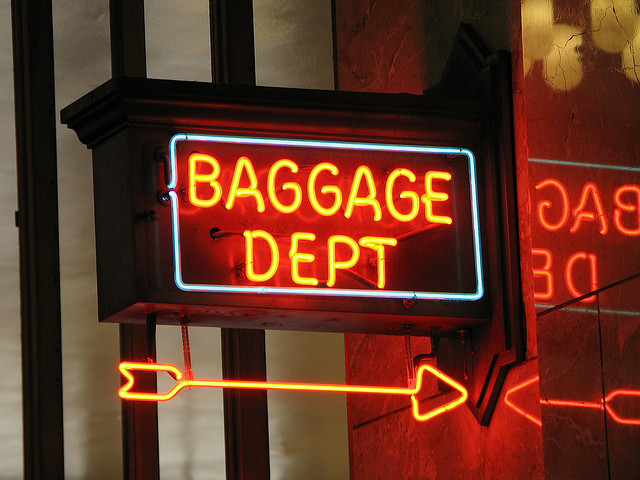
Yesterday I realized that I have what you might call, “Christian baggage.”
To many, this will come as no surprise. It’s been said as much on post after post, and in the occasional Pagan forum thread. In response, I always said that I didn’t think that label was fair. Most times I think I was correct. To write about or reflect on my Christian past is not, in my opinion, the same thing as having baggage.
Reflection is not baggage. Contemplation is not baggage.
But what happened yesterday was different. In a conversation with my husband about my knee-jerk reaction to a kind, innocuous comment left on my post about going to church by the very priest who gave the inspirational sermon I spoke of, I realized that when I was a Christian I believed — on some level — that my paradigm was the correct paradigm.
By that I mean that when we affirmed in the Creed that there was “one God, the Father Almighty, maker of Heaven and Earth…” we were affirming something that was true. It must be true, I thought, even if only in some mysterious, esoteric manner beyond my comprehension, in order for the whole thing (the Gospel, the Jesus, the God) to have meaning.
Also, if my paradigm was true, that meant that other paradigms, if they were different, were not true. For example, if there was only one God, there were not two. If God was the creator of all things, there were no other creators.
Plain and simple.
As I unpacked these ideas I recognized a rigidity within me that I never knew I had. Even if I hadn’t held up cardboard signs proclaiming that my truth was the one and only truth, I stood up in church every weekend and reinforced the idea that my truth was the one and only truth.
Now, there are those for whom the Creed does not serve this purpose: the words are spoken, but not necessarily law. Converts to a creedal tradition, for example, might be capable of taking a more objective stance to their newfound credal affirmations. For them, the value in speaking the Creed aloud might simply be in the strengthening of the group bond.
But as a “cradle Episcopalian,” a child who was speaking “I believe” statements before I could understand what those “I believe” statements even meant, those words have carved a deep groove in me. Even when I no longer speak them, their echo is still present.
My husband suggested that perhaps we re-write the Creed, just as an exercise. Maybe that would release some of its hold on my psyche.
It might start something like…
We believe in this one god,
A father, kind of almighty,
One of the makers of heaven and earth,
Of some things, seen and unseen….
To creedal Christians reading this blog (and I’m not sure there are many of you), I mean no disrespect by this re-write. It isn’t for you, it’s for me. Adjusting the language allowed me to laugh at my own inner rigidity. Speaking these new words out loud made it feel like the old words are in fact not law, but rather one of many ways of believing.
In that moment, there was plurality.

Photo by Paul Gorbould
My friend William, an ADF Druid, reminds me often that dualism — the view that the universe is divided into opposites like good/evil, right/wrong, heaven/hell — undergirds much of our Western thinking. Even if we profess to be pluralists, we still fall back on dualism as a default. Just look back on all of the conversations we’ve had about Pagan v.s. Polytheist. That’s dualism right there. The entire firestorm about gender-exclusive ritual can be seen as a biproduct of dualistic thinking (i.e. we are either male or female — end of story).
Perhaps dualism is my Christian baggage.
If that is true (or if it is one of many truths), what do I do with that information?
How does one take apart dualism? By introducing a third way? How do you hold the tension for more than two, opposite ways of thinking, being, or doing? How, I wonder, do I work to develop an ongoing personal practice that is relevant to me without slipping into a perspective that holds up my practice as the right way?
Have you stared your own dualism in the face? What did you see? How did you respond?
Leave a Reply